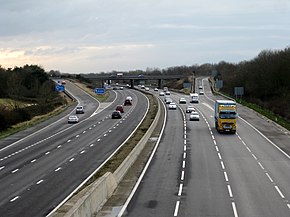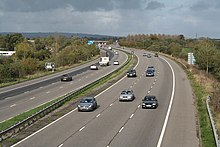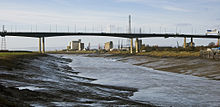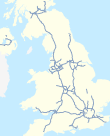M5 motorway
| M5 | ||||
|---|---|---|---|---|
 Looking south towards junction 20 | ||||
| Route information | ||||
| Maintained by National Highways | ||||
| Length | 162.9 mi (262.2 km) | |||
| Existed | 1962–present | |||
| History |
| |||
| Major junctions | ||||
| Northeast end | West Bromwich | |||
| ||||
| Southwest end | Exminster | |||
| Location | ||||
| Country | Primary destinations | |||
| Road network | ||||
| ||||
The M5 is a
Route

The M5 quite closely follows the route of the A38 road. The two deviate slightly around Bristol and the area south of Bristol from junctions 16 to the Sedgemoor services north of junction 22. The A38 goes straight through the centre of Bristol and passes by Bristol Airport, while the M5 skirts both, with access to the airport from junctions 18, 19 or 22. The A38 continues south into Devon from junction 31, near Exminster.
Junction 15 of the M5 is a large four-level stack interchange, named the Almondsbury Interchange, where the M5 meets the M4. The Avonmouth Bridge, between junctions 18 and 19, is often a bottleneck during heavy traffic periods, due mainly to lane drops at either end of the bridge for the respective junctions, and the sharp angle in the centre of the bridge, which causes larger vehicles to slow considerably.[citation needed] There are split-level carriageways where the M5 ascends the hillsides above the Gordano Valley, between Portishead, junction 19 and Clevedon, junction 20. Between junction 21, Weston-super-Mare and junction 22, Burnham-on-Sea, the M5 passes by an isolated landmark hill called Brent Knoll and crosses the western end of the Mendip Hills. The Willow Man sculpture is visible from both carriageways, and acts as a landmark just to the south of junction 23, which as of 2021[update] had degraded and lost its head and arms.[1]
History
Construction
The first 26 miles (42 km) of the M5 motorway was constructed as a dual two-lane motorway with
Worcestershire County Council, the police and particularly the county surveyor of Worcestershire made repeated representations that a dual three-lane standard motorway was appropriate. The Ministry of Transport insisted that a dual two-lane motorway would be built at a cost of around £8 million. The Motorways Archive also records that the carriageways were also built to a lower overall width of 88 feet (27 m) rather than 100 feet (30 m) to reduce the loss of agricultural land. When the decision became necessary to widen the Worcestershire section of M5, it cost £123 million.[4]
The 2-mile (3.2 km) dual two-lane section between junctions 16 and 17 built at Filton, near Bristol, was also opened in 1962, and was intended to replace the pre-war Filton bypass.[2][3][5] Gloucestershire County Council acted as engineer for this section, which was widened to a dual three-lane motorway in 1969.[3]
North of junction 4 the M5 was constructed in sections, from 1967 to 1970, together with the Frankley services. Much of the northern section beyond junction 3, from about Oldbury to the junction with the M6 motorway, was constructed as an elevated dual three-lane motorway over Birmingham Canal (Old Main Line), Birmingham Canal (New Main Line), and Titford Pool using concrete pillars.[3]
The M5 was also extended southwards, in sections, from 1967 to 1977, through Gloucestershire and Somerset, to Exeter in Devon as a dual three-lane motorway,[3] together with the Strensham services.
The short section between junctions 27 and 29 was built between 1967 and 1969, by Devon County Council, as the A38 Cullompton Bypass, with the intention that it should become part of the M5.[2] The termini for this section have since been removed, although part of the southern terminal roundabout is now used as an emergency access.[6] The section was developed to motorway standards, and incorporated into the M5 in 1975.[2]
Operational history
Junction 1 surrounds a surviving gatehouse from the former Sandwell Hall. The section from junctions 16 and 18 was illuminated in about 1973 as part or a wider policy announced by Minister for Transport Industries, John Peyton, in 1972 to illuminate the 86 miles (138 km) of UK motorway particularly prone to fog.[7]
In the late 1980s, junction 4a was built as part of the M42 motorway construction project. The route of the M42 was decided as early as 1972 but, owing to planning delays, the short section of the M42 north of Bromsgrove did not open until December 1989.[8]
As the M5 traffic increased in the 1980s, junction 11, the main Gloucester and Cheltenham access (via the A40 Golden Valley by-pass) became increasingly congested. At the same time there were plans for large scale business and housing developments at Brockworth, near Gloucester. To relieve junction 11 of some of the new traffic generated, & avoid more congestion around both Cheltenham & Gloucester, a new junction, 11A, 3.5 miles (5.6 km) south of junction 11, was constructed and opened in the mid-1990s. A further feature of this junction was to create a new route from the south west Midlands to London and central southern England via the A417, A419 and the M4 at junction 15.

The Avonmouth Bridge was converted to eight lanes (four lanes in each direction) in the early 2000s. Later, in 2005–2006, parts of the M5 between junctions 17 and 20 were widened to 7 lanes (four lanes climbing the hills and three lanes descending the hills);

In 2002, extended exits for junction 12 were constructed. The
The Cullompton services are signed on the motorway in the northbound direction only. This was implemented to reduce congestion at the low capacity junction, although there is still access available to the services southbound through the junction. Also, the northbound exit slip to the junction was reduced to one lane instead of two to reduce traffic on the small roundabout at the west side of the junction.

In 2009, it was announced that the lighting between junctions 30 and 31 would be turned off between midnight and 5.00am to save energy.[13]
Proposals were announced in September 2009 for a new
In September 2020,
Future developments
In 2020, it was announced that junction 10 would be undergoing significant roadworks as part of a redevelopment project on the A4019. The works will involve making the interchange full-access and dualling the A4019 east of the junction into Cheltenham.[18] Works will commence in 2023 (subject to permission being granted) and be completed in 2024, according to the Gloucestershire County Council.[18]
There have been suggestions that the Government extend the M5 south, to the city of Plymouth, which currently relies on the A38 road. The argument for such an extension has intensified in light of the closure of Plymouth City Airport in 2011, and the 2014 breaching of the South Devon Railway sea wall following storms that in turn, cut off Plymouth and Cornwall's rail access.[19][20]
Improvements to junction 25 at Taunton were approved with an £18 million programme that will include the enlargement of the junction roundabout, the widening of the eastern junction slip road exit, and an additional roundabout southeast of the junction to provide access to a new business park and to a proposed bypass of the
Incidents and events
Discovery of bones
In October 2009, workmen clearing vegetation from the slip road at junction 14 discovered human
2011 multi-vehicle collision
On the evening of Friday 4 November 2011, seven people were killed and a further 51 injured in a major crash involving over 50 vehicles which included cars, vans and large goods vehicles near junction 25 in West Monkton, near Taunton.[24] Several vehicles were burnt out in the fire which developed at the scene as the result of a series of explosions, and the road surface was seriously damaged, not just by the fire and explosions, but also by fuel spillage.[25] The cause of the crash, which took place in wet foggy conditions close to a firework display, was investigated. One person was charged for breach under health and safety laws and found not guilty.[26]
Junctions
This article contains a bulleted list or table of intersections which should be presented in a properly formatted junction table. (December 2021) |
Data from
Cultural references
M5#1 is a song from the 1994 album Middle Class Revolt by post-punk band The Fall which uses the M5 to describe reverting to a romanticised agricultural past that never really existed.[30]
See also
References
Notes
- ^ "M5 Somerset Willow Man: 'Can't let him fall apart'". BBC News. 13 August 2021. Retrieved 8 January 2023.
- ^ a b c d e Charlesworth (1984), pp. 135–140
- ^ a b c d e Charlesworth (1984), pp. 100–123, Table 7.3
- ^ a b "M5 Widening between Junctions 3 & 8". CIHT. Retrieved 7 January 2021.
- ^ Ordnance Survey One Inch Map of Great Britain, Series 7 Sheet 156, major roads revised 1963.
- ^ "SABRE Photo Gallery".
- ^ "News: Motorway lighting". Autocar. Vol. 137 nbr 3978. 13 July 1972. p. 19.
- ^ "The Motorway Archive – M42". Iht.org. Archived from the original on 14 June 2009. Retrieved 31 December 2011.
- ^ Sky News – UK's Longest Contraflow Archived 14 June 2007 at the Wayback Machine
- ^ "'Most complex' contraflow". BBC News. 29 October 2005. Retrieved 31 December 2011.
- ^ Western Daily Press – West beware! It's Britain's biggest road contraflow
- ^ "Agency admits error over junction". BBC News. British Broadcasting Corporation. 18 November 2005. Retrieved 1 January 2008.
- ^ "Night switch-off for M5 lighting". BBC News. 12 March 2009. Retrieved 10 August 2010.
- ^ "Eco-services plan for M5". This is Gloucestershire. 17 September 2009. Archived from the original on 11 September 2012. Retrieved 15 January 2010.
- ^ "Plans for Gloucestershire M5 service station approved". BBC News Gloucestershire. 10 August 2010. Retrieved 10 August 2010.
- ^ "Planning background". Gloucestershiregatewayservies. Archived from the original on 28 October 2010. Retrieved 11 November 2010.
- ^ "Motorways to trial 60mph limits to cut pollution". BBC News. BBC. 12 September 2020. Retrieved 12 September 2020.
- ^ a b "Pinpoint". m5-junction-10-have-your-say.gloucestershire.gov.uk. Retrieved 25 November 2020.
- ^ "M5 will be extended to Plymouth if these business leaders get their wish". Cornwall Live. 27 September 2017. Retrieved 13 December 2017.
- ^ "Calls to extend M5 from Exeter to Plymouth". ITV. 20 November 2017. Retrieved 13 December 2017.
- ^ "Taunton £18m motorway upgrade approved". BBC News. 9 March 2018.
- ^ "M5 bones find confirmed as female". BBC News. 7 October 2009. Retrieved 15 December 2022.
- ^ "Man held over Melanie Hall M5 murder inquiry". BBC News. 1 July 2010. Retrieved 3 March 2013.
- ^ "Seven confirmed dead in M5 accident in Somerset". BBC News. 5 November 2011. Retrieved 6 November 2011.
- ^ O'Carroll, Lisa (5 November 2011). "M5 Crash: Latest Updates: Live". The Guardian. Retrieved 5 November 2011.
- ^ Bayley, Jon (7 November 2011). "Police investigate smoke as possible cause of M5 pile-up in which seven died". Western Morning News. Archived from the original on 15 January 2014. Retrieved 15 February 2016.
- Highways Agency. Archived from the originalon 10 February 2012. Retrieved 4 November 2009.
- ^ J11-J18: Driver Location Signs, M5 J18-11, M4 J22-15 (map) Highway Authority 2009
- ^ J19-J30: Driver Location Signs, M5 J19-30 (map) – Highway Authority, 2009
- ^ "The Annotated Fall - M5 #1". The Annotated Fall. 17 November 2019. Retrieved 9 December 2019.
Sources
- Charlesworth, George (1984). A History of British Motorways. London: Thomas Telford. ISBN 0-7277-0159-2.
Further reading
- Jackson, Mike (2003). The M5 Sights Guide. Severnpix. ISBN 978-0954540203.
External links
![]() Geographic data related to M5 motorway at OpenStreetMap
Geographic data related to M5 motorway at OpenStreetMap




